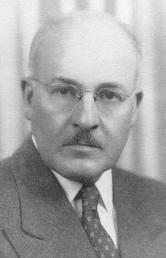
Clinton Lee Scott (September 28, 1887-September 28, 1985), a Universalist minister, played a major role in the revitalization of the Universalist denomination during the 1930s, ’40s and 50’s, and also in the process leading to its merger in 1961 with the American Unitarian Association. Born into a Vermont farm family, the tenth of twelve children, he became a granite cutter as a youth. Later, while attending Goddard Seminary, he was converted to Universalism while serving as the organ pumper in the local Universalist church. Determined to enter the ministry, he enrolled at Tufts College as a pre-theological student. He earned an A.B. in 1914 and a S.T.B. a year later.
All but ten of Scott’s 56 years in the ministry were served in the parish. His first call, in 1914, was to the Universalist Church in Northfield, Vermont. There followed settlements at Grace Universalist Church in Buffalo, New York, 1916-20; the Church of the Restoration in Philadelphia, Pennsylvania, 1920-23; the First Universalist Church of Los Angeles, California, 1923-26; the United Liberal Church in Atlanta, Georgia, 1926-30; the Universalist Church of Peoria, Illinois, 1930-40; the Unitarian Church of Dayton, Ohio; the Universalist Church in El Dorado, Ohio, 1940-42); and the Independent Christian Church, Universalist in Gloucester, Massachusetts, 1942-46. After ten years as state superintendent for the Massachusetts Universalist Convention, 1946-56, and the Connecticut Universalist Convention 1951-56, Scott returned to parish work, serving the Universalist Church of Tarpon Springs, Florida, 1956-71. He retired at age 84, reportedly because increasing deafness make it difficult for him to participate in sermon discussions.
Clinton Scott was admired for the wit and wisdom of his sturdy, outspoken liberalism. A witty conversationalist, public speaker and writer, he delighted others with the limericks he distributed in celebration of Ground Hog Day and with his small volume of Parish Parables, first published in 1946 and still widely in use at the turn of the century. His other writings include Religion Can Make Sense, 1949, a collection of radio addresses delivered during his tenure as state superintendent; The Universalist Church of America: A Short History, 1949; These Live Tomorrow: Twenty Unitarian Universalist Biographies, 1964; Promise of Spring, a UUA meditation manual, 1976; and Some Things Remembered, a short memoir, 1976. He also authored numerous articles and promotional pamphlets.
Scott was a change agent in many areas of denominational and public life. As one of the few outspoken pacifists in the Universalist ministry, his views almost cost him his fellowship during World War I. As a social activist, he opposed racial segregation in Atlanta and, with great personal danger, a gambling syndicate in Peoria. As a religious thinker, he was the first prominent Universalist to embrace humanism, signing the Humanist Manifesto in 1933. As a mentor, he helped numerous fledgling ministers get started in their vocation. As a promoter of liturgical innovation in the years following World War II, he led the effort to establish the experimental Charles Street Meeting House in Boston and was a strong supporter of the Humiliati, a group of reform-minded Tufts ministerial graduates. As a creative institutionalist, he strengthened and liberalized the Massachusetts Universalist Convention, organized the Universalist Church of the Larger Fellowship (a “church-by-mail” for isolated Universalists), played a major role in the Unitarian-Universalist merger process, and served on the UUA’s first Board of Trustees.
In 1913 Clinton Scott married Edith Tripp; they had two daughters, Florence and Martha. In 1930, five years after Edith’s death, he married Mary Slaughter, a member of the Universalist church in Camp Hill, Alabama, of which his brother Harold was minister. Mary was so well known throughout the denomination, as a field worker for the Universalist Sunday School Association, that for a while Clinton was known to many as “Mary Slaughter’s husband.” The two worked closely together in parish, convention and denominational affairs for many years. Their only child, Peter Lee, became a Universalist minister. Mary died in 1973.
During Scott’s long career, his religious thinking evolved from liberal Christian, to Christian humanist, to global humanist. “When Universalists avow their faith in the leadership of Jesus,” he wrote, “they mean not faith in a religion about Jesus, but in the religion of Jesus . . . [N]o man in history has impressed his teaching upon the world by precept and example as Jesus did.”
At a later time he wrote: “A true universalism in religion goes beyond Christian denominationalism and sees all religions of whatever time or place striving in imperfect ways to achieve a good life for man. . . . This is one world where all things of worth are sacred.”
Scott was and continues to be regarded as a good, common sense thinker without theological or philosophical pretensions. He served the Universalist movement with deep commitment, diligence, and integrity as minister, mentor, administrator, member of boards and committees, social activist, and writer. Among his honors were a D.D. degree from St. Lawrence University and an Award for Distinguished Service to the Cause of Unitarian Universalism from the Unitarian Universalist Association.
Clinton Lee Scott died on his ninety eighth birthday. He had remained vigorous in body and mind almost to the end.
Sources
Some Scott papers are in the Universalist Collection at the Andover-Harvard Theological Library at the Harvard Divinity School in Cambridge, Massachusetts; there are other papers in the possession of his son, Peter Lee Scott. Clinton Lee Scott wrote a memoir, Some Things Remembered (1976). Biographical articles include Charles A. Howe, “He Lives Tomorrow: Clinton Lee Scott, Revitalizer of Universalism,” Proceedings of the UU Historical Society (1989); and an obituary by Peter Lee Scott in the UUA Directory (1987).
Article by Charles A. Howe
Posted November 6, 2000